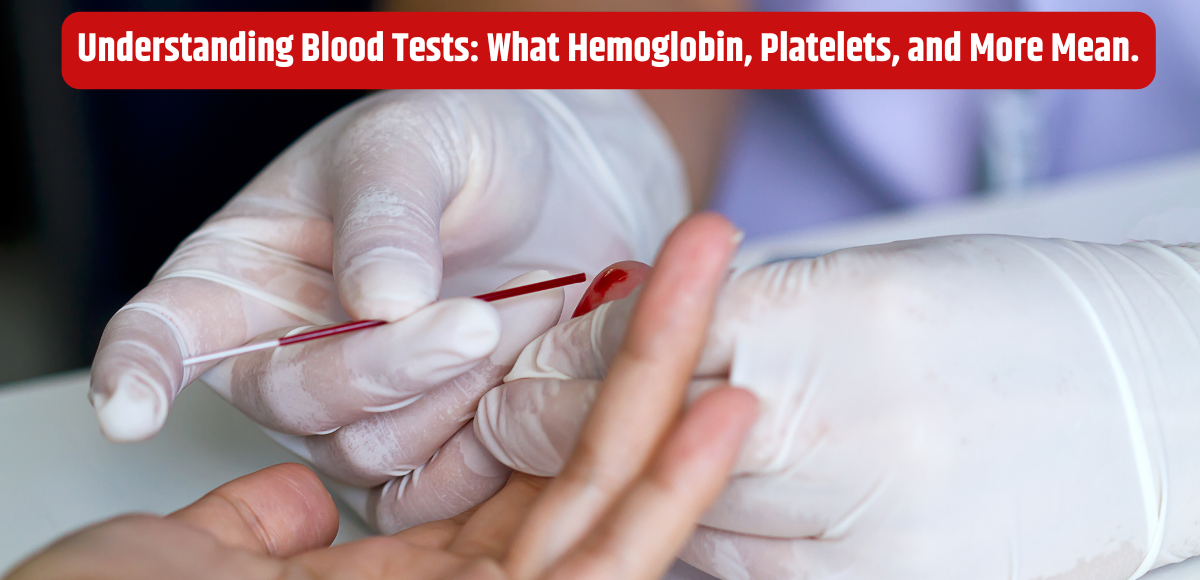
- November 15, 2024
Understanding Blood Tests: What Hemoglobin, Platelets, and More Mean.
Understanding Blood Tests: What Hemoglobin, Platelets, and More Mean.
Blood tests are important for understanding your health. They provide information about your body’s systems and help doctors detect or monitor conditions. If you have questions about terms like hemoglobin, platelets, or white blood cells, this guide is for you. A hematologist in Pune, Dr. Chandrakant Lahane, can explain these details clearly and guide you.
What is a blood test, and why is it done?
A blood test involves taking a small sample of your blood to check for different markers. It helps doctors find signs of conditions like anemia, infections, or clotting problems. Regular blood tests can track your health and provide early signs of any issues.
What does hemoglobin mean in a blood test?
Hemoglobin is a protein in red blood cells that carries oxygen throughout your body.
Normal levels:
Men: 13.8–17.2 g/dL
Women: 12.1–15.1 g/dL
Children: 11–16 g/dL
Low levels: May point to anemia caused by low iron, blood loss, or health conditions.
High levels: Could indicate dehydration, smoking, or certain diseases.
What are platelets, and what do they show in a blood test?
Platelets are small cells in your blood that help form clots to stop bleeding.
Normal levels: 150,000–450,000 per microliter of blood.
Low platelet count: Can suggest issues like dengue fever, certain diseases, or medication effects.
High platelet count: May indicate inflammation, infections, or other medical conditions.
What do white blood cells (WBC) indicate?
White blood cells are part of your body’s defense system. They fight infections and respond to injury.
Normal levels: 4,500–11,000 cells per microliter.
Low levels: Could indicate a viral infection or problems with your immune system.
High levels: May show infections, stress, or other conditions.
What does a complete blood count (CBC) include?
A CBC is a test that measures:
Red blood cells (RBC)
White blood cells (WBC)
Hemoglobin
Hematocrit (the percentage of red blood cells in your blood)
Platelets
It helps doctors check for anemia, infections, and other problems. If you need help understanding your CBC results, a hematologist in Pune , Dr. Chandrakant Lahane, can assist you.
What is hematocrit, and why is it measured?
Hematocrit shows the percentage of your blood made up of red blood cells.
Normal levels:
Men: 41%–50%
Women: 36%–48%
Low levels: May indicate anemia or blood loss.
High levels: Can suggest dehydration or lung problems.
What is the role of blood sugar in tests?
Blood sugar (glucose) tests check for diabetes or other conditions.
Normal fasting levels: 70–99 mg/dL
Prediabetes levels: 100–125 mg/dL
Diabetes levels: 126 mg/dL or higher
How can I prepare for a blood test?
To get accurate results:
Fasting: Avoid eating or drinking (except water) for 8–12 hours if required.
Medication: Inform your doctor about any medicines you take.
Stay Hydrated: Drinking water makes the blood draw easier.
How often should I have a blood test?
This depends on your age, health, and medical history. Adults are often advised to get blood work done once a year or as their doctor suggests.
Can I improve my blood test results naturally?
Yes, by making healthy choices:
For hemoglobin: Eat iron-rich foods like spinach, lentils, and red meat.
For platelets: Include foods like papaya and pumpkin seeds.
For blood sugar: Exercise regularly and limit sugary foods.
Blood tests provide useful insights into your health. They can help you detect problems early and take action.
